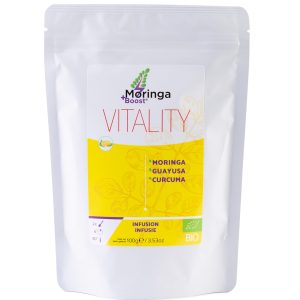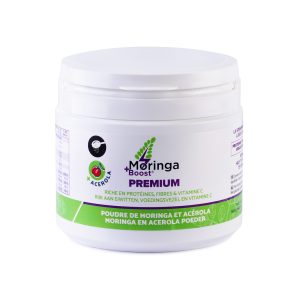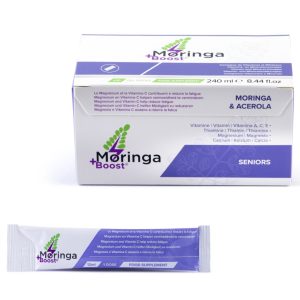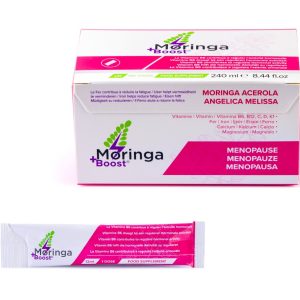Burnout, the silent disease that affects more and more people worldwide, is a complex phenomenon with devastating consequences. It’s a state of emotional and physical exhaustion caused by chronic stress, which has become a major health problem in modern society.
People suffering from burnout often need a holistic approach to recovery, and Moringa can play a crucial role in this healing process.
Let’s find out what causes it, who’s most likely to suffer from it, and how diet, particularly moringa consumption, can play a key role in the recovery process.
● Who is affected by burnout?
Burnout spares no one. It affects people of all ages, professions and socio-economic backgrounds. However, certain categories of people are more likely to be victims than others.
Hard workers
People who put their heart and soul into their work are particularly prone to burnout. Emotionally demanding professions, such as healthcare professionals and teachers, are often affected. They are often caught in a cycle of exhaustion, compassion and emotional detachment, known as “caregiver syndrome”.
Perfectionists
Individuals with unrealistic expectations of themselves are more likely to suffer burnout. The constant need for perfection can lead to emotional and professional burnout. The relentless pursuit of excellence can be a major factor contributing to stress.
People under chronic stress
Prolonged stress, whether related to work, personal life or other factors, can lead to burnout. Financial worries, family conflicts or health problems can contribute to chronic stress. Coping with chronic stress requires a strategy that includes the support of a GP and the use of natural food supplements.
Self-employed workers and contractors
While independence can offer professional freedom, it can also bring stress levels related to financial security and workload. Entrepreneurs are often under pressure to succeed, which can expose them to burnout.

● Why does burnout happen?
It is generally the result of an accumulation of emotional and physical stress. These are major risk factors, and an appropriate diet can play a role in managing them.
Several factors contribute to its development.
Work overload
When work demands exceed an individual’s capabilities, the risk of burnout increases. Long working hours, tight deadlines and excessive responsibilities are all stressors. The culture of “always more” and the pressure to increase productivity are significant stress factors.
Lack of social support
Lack of support from colleagues or management can increase vulnerability to burnout. Isolation at work can be particularly damaging. A healthy work environment that fosters collaboration, communication and empathy can reduce the risk of its occurrence.
Work-life imbalance
Lack of work-life balance can lead to burnout. Time spent at work must be offset by periods of relaxation and recuperation. Employers and individuals need to work together to promote a better balance between these two spheres.
Loss of meaning
When work becomes monotonous and meaningless, individuals are more likely to suffer from feelings of malaise of varying degrees of severity. Motivation and commitment diminish, giving way to frustration. Meaning at work is crucial to satisfaction and well-being.
● Diet to combat burnout
A balanced diet is crucial for preventing and recovering from burnout. Food choices can influence mental health, energy and resilience to stress. When faced with such an emotional situation, it’s crucial to use stress management strategies and comfort food. Good nutrition is the cornerstone of mental health, especially when it comes to recovery.
Anti-stress foods
Sleep disorders, often associated with burnout, can be alleviated by a diet rich in nutrients such as moringa. Certain foods are known to reduce stress and promote relaxation. Foods rich in magnesium, such as nuts, seeds and green leafy vegetables, help regulate the nervous system. Green leafy vegetables, in particular, are rich in magnesium, which can help reduce anxiety.
Tryptophan-rich foods
Tryptophan is an amino acid precursor of serotonin, a neurotransmitter that regulates mood. Tryptophan-rich foods such as turkey, chicken, salmon, moringa leaf powder and pumpkin seeds can contribute to better stress management by promoting serotonin production.
Omega‑3 fatty acids
The omega‑3 fatty acids found in oily fish, nuts and seeds have anti-inflammatory effects and can help alleviate stress symptoms. Omega‑3 fatty acids are essential for brain function and can improve mental health.
Antioxidants
Antioxidants found in colorful fruits and vegetables, such as berries, citrus fruits, carrots, moringa and spinach, help fight oxidative stress, which is associated with burnout. Antioxidants protect brain cells from stress-induced damage.
Avoid stimulants
Caffeine, sugar and processed foods can aggravate the symptoms of stress and anxiety. They can cause energy spikes followed by dips, which can disrupt emotional stability. It is recommended to limit their consumption.
● The role of moringa in the recovery process
For those looking for natural remedies, moringa offers a soothing alternative for body and mind.
Moringa, a plant native to India and now cultivated in southern Europe, is increasingly recognized for its health benefits. It can play a significant role in the burnout recovery process.
Rich in nutrients
This plant is a natural source of essential vitamins, minerals and antioxidants, making it an excellent dietary supplement for boosting the immune system weakened by stress. It is particularly rich in vitamin C, vitamin A, iron, calcium and potassium. Moringa, used as a dietary supplement, supports physical and mental recovery during and after burnout.
Anti-inflammatory effect
Moringa has anti-inflammatory properties, which can help reduce the physical symptoms of burnout, such as muscle and joint pain. Chronic inflammation is often associated with stress and can be alleviated by regular consumption of moringa.
Stress management
Moringa is rich in amino acids, notably tyrosine, which plays a key role in the production of neurotransmitters such as dopamine and noradrenaline, contributing to better stress management. These neurotransmitters are linked to mood regulation and stress response.
Enhanced well-being
Regular consumption of moringa can contribute to better mental and emotional balance, promoting recovery. Importantly, it is also associated with improved digestion, which can reduce stress-related gastrointestinal disorders.
Improved cognitive function
Moringa contains powerful antioxidants, such as polyphenols, which can help reduce inflammation and protect the brain from oxidative stress, which is crucial for people experiencing burnout, as they are often more prone to cognitive impairment.
Fights fatigue
Chronic fatigue is a common symptom of burnout, and Moringa offers a natural source of energy thanks to its proteins and iron. It can help combat fatigue and restore physical vitality, which is essential for regaining optimal quality of life.
Consuming this dietary supplement can be a real boost to your energy, especially when fighting burnout-related fatigue.
Supports digestive function
In infusion, moringa can support digestion, which is often disrupted in burnout sufferers due to constant stress. Healthy digestion is crucial for optimal nutrient absorption and the production of neurotransmitters essential for emotional balance. Moringa’s high fiber content also facilitates intestinal transit, essential for optimal health.

● How can you incorporate moringa into your diet?
Enriched smoothies
Enrich your blended drinks with 1–2 teaspoons of Moringa & Acerola MoringaBoost PREMIUM powder for a significant nutritional boost. This addition gives your smoothies a subtly herbaceous, spicy flavour, while providing an exceptional energy boost.
Moringa powder, already recognized for its virtues, is complemented by the benefits of Acerola, a superfruit surpassing oranges in Vitamin C content and rich in Minerals and Antioxidants. It provides Iron, Phosphorus, Betacarotene (Provitamin A), as well as Polyphenols, vigorous antioxidants fighting against oxidative stress and cellular damage due to various environmental factors.
Energizing infusion MoringaBoost VITALITY
Made with Moringa, Guayusa and Curcuma, this infusion is designed to provide the antioxidants and energy needed for an energetic, comfortable day, while strengthening the immune system.
Guayusa, rich in amino acids, vitamins and antioxidants, promotes concentration and boosts energy in a gentler, longer-lasting way than traditional caffeine. Turmeric, meanwhile, is renowned for its antioxidants and remarkable anti-inflammatory properties.
Enhanced with lemongrass and lemon zest, and sweetened with a hint of Stevia, a cup of this infusion in the morning and another in the early afternoon guarantee a continuous supply of antioxidants and energy.
Tip: Infuse 2 teaspoons of MoringaBoost VITALITY infusion in 250 ml of water at 80° C for 6 minutes.
In summer, take it with you to enjoy fresh all day long. It’s a light, thirst-quenching drink, perfect for replacing tea or coffee.
Energy snacks
Incorporate MoringaBoost PREMIUM Moringa & Acerola Powder into your homemade energy preparations, combined with nuts, seeds and dried fruit. It’s the ideal option for an invigorating snack, rich in plant proteins, antioxidants, Omega 3, Vitamins A and C, among other nutrients.
Supplements for immune defense
For those seeking to strengthen a weakened immune system, particularly through burnout, MoringaBoost offers IMMUNE SYSTEM capsules. To be consumed over a period of 60 consecutive days, these capsules contain moringa, zinc, magnesium and vitamin D, forming an energizing cocktail for the body.
● Conclusion
It’s a serious health problem that can affect anyone. Recognized as an occupational disease, it requires comprehensive management, with diet playing a key role. It’s a good idea to talk to your GP about incorporating any supplements into your diet to combat burnout.
There are many causes, but a balanced diet can play an essential role in prevention and recovery. Moringa, in particular, offers many benefits for those struggling with burnout. It’s just one element in a comprehensive approach to disease management, but it can be a valuable component of the road to recovery.
It’s important to remember that burnout is a serious condition, and that it’s essential to seek professional help when necessary. The combination of a healthy diet, stress management techniques and a strong support network can help prevent this from happening and promote recovery.
● References
- Anti-fatigue properties: Cureus — Nature’s Gold (Moringa Oleifera): Miracle Properties
- Protection against chronic disease: PubMed Central — Bioactive Components in Moringa Oleifera Leaves Protect against Chronic Disease
- Trois burnouts, sinon rien — Victor de Bock, Editions de l’Officine, Paris. https://victordebock.be/ngg_tag/trois-burn-out-sinon-rien










